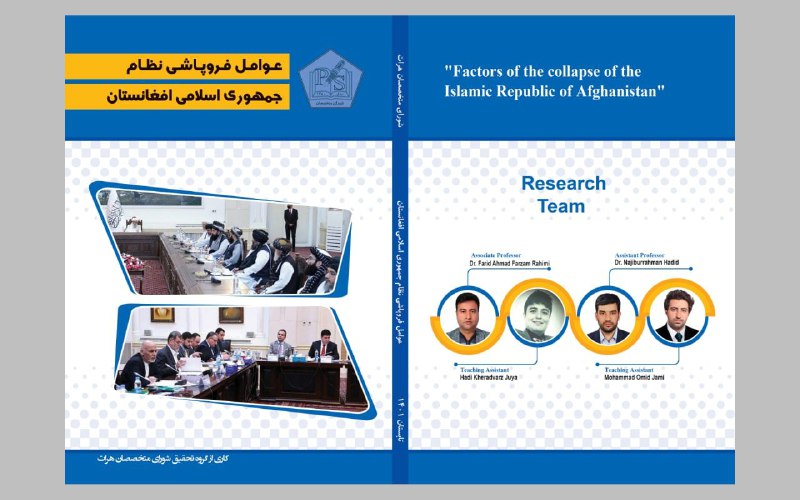پدیدآورندهگان اثر: دکتر نجیبالرحمن حدید، دکتر فرید احمد فرزام رحیمی،محمد امید جامی و هادی خردورزجویا
چکیده
تاریخ معاصر افغانستان شاهد فراز و فرودهای فراوانی است. سیر تحول نظام سیاسی و حکومتداری در کشور، در طول دو قرن گذشته، بهجای سیر تکاملی، روندی متناوب را تجربه کرده است. در دورههای مختلف تاریخ سیاسی، نسخههایی از نظامهای اقتدارگرا و آزادیگرا در کشور، بهصورت متناوب، اعمال قدرت کردهاند. این تغییر نظامهای مختلف سیاسی و روند تناوبی تجربه نظامهای سیاسی، حکومتداری در کشور را همواره با نبود ثبات سیاسی روبرو کرده است. در این میان، شش دهۀ اخیر در تاریخ معاصر کشور، بهنسبت تحولات سیاسی فراوان، شاید حائز اهمیت فراوانی است. سقوط “امارت اسلامی” در سال 1380 هجری شمسی و ایجاد نظام جدید در افغانستان، با مداخلۀ جامعه جهانی، در ابتدا در نوشتار بسیاری از صاحبنظران به تولد یک دموکراسی جدید تعبیر شد، اما بهمرور، با گذشت زمان و ثبت رکوردهای بیسابقه در اجرای سازوکار تعریفشده دموکراتیک، باورها را به دوام و استحکام این دموکراسی کمرنگ ساخت. هر چند در کنفرانس بُن، که اواخر همان سال برگزار شد، جامعه جهانی متعهد به ایجاد یک نظام “مردمسالار” و “فراگیر” در کشور شد، اما با گذشت بیست سال و صرف میلیاردها دالر کمک بینالمللی و کشتهشدن بیش از چهارصد هزار نفر مردم این سرزمین، نهتنها این وعده تحقق نپذیرفت، بلکه خروج قوای بینالمللی از افغانستان، در نتیجۀ توافق دوحه، و حاکمیت مجدد “امارت اسلامی” در کشور، بهنظر میرسد، بهیکباره، نقطۀ پایانی بر پروژه بُن و رهایی تمامی دستاوردهای اعلامشده در این عرصه بود. این پژوهش، با روش مصاحبه، با مطالعۀ دیدگاه شانزده نفر از صاحبنظران، به تعریف و دستهبندی عوامل فروپاشی “نظام جمهوری اسلامی افغانستان” پرداخته است. براساس یافتههای این پژوهش، در مجموع ده عامل اساسی در قالب دو دسته عوامل داخلی و خارجی، عوامل بحران و فروپاشی “نظام جمهوری اسلامی” در کشور تعریف میشوند. ازجمله موارد یادشده، هفت مورد، بهعنوان علل داخلی، و سه مضمون دیگر، بهعنوان علل خارجی، این تحول شناخته میشوند.
واژگان کلیدی: دموکراتیزاسیون،جمهوری، “نظام جمهوری اسلامی افغانستان”.
Abstract:
The contemporary history of Afghanistan has seen many ups and downs. The evolution of the political systems and governance in the country during the past two centuries has time and again undergone through an intermittent process instead of an evolutionary route. In short, our political history experienced various versions of authoritarian and libertarian systems.
Due to the changes and the intermittent process of political systems, the country has always faced the lack of political stability in its governance. In the meantime, because of the many political developments, the last six decades of country’s contemporary history is perhaps very important.
The fall of the “Islamic Emirate” in 2001, and the establishment of a new political system in Afghanistan, with the intervention of the international community, was initially recognized as the birth of a new democracy in the literature of many experts. But as time passed, this understanding significantly faded away due to a wide range of failures in implementation of democratic values.
Although at the Bonn conference, the international community pledged to create a “democratic” and “inclusive” government in the country, but, after twenty years and with billions of dollars of international aid money spent, and more than 400,000 casualties, not only this promise was not fulfilled, but the withdrawal of international forces from Afghanistan, as a result of the Doha agreement, and the re-establishment of the Islamic Emirate in the country, seems to have been the end point of the Bonn project and all achievement.
This research has defined and classified the factors of the collapse of the “Islamic Republic of Afghanistan” by studying the views of sixteen experts through Key Informant Interviews (KIIs).
Based on the findings of this research, in total, ten essential factors are defined in the form of two categories of internal and external factors, which caused crises that eventually resulted the collapse of “Islamic Republic Regime” in the country. Among the above-mentioned factors, seven are categorized as internal, and other three are categorized as external factors causing the transformation of power.
Keywords: Democratization, Republic, “Islamic Republic of Afghanistan”.
این اثر را میتوانید از چوک گلها،جنب کتاخانه عامه هرات، کتابخانه فاروقی بدست آوردید.
